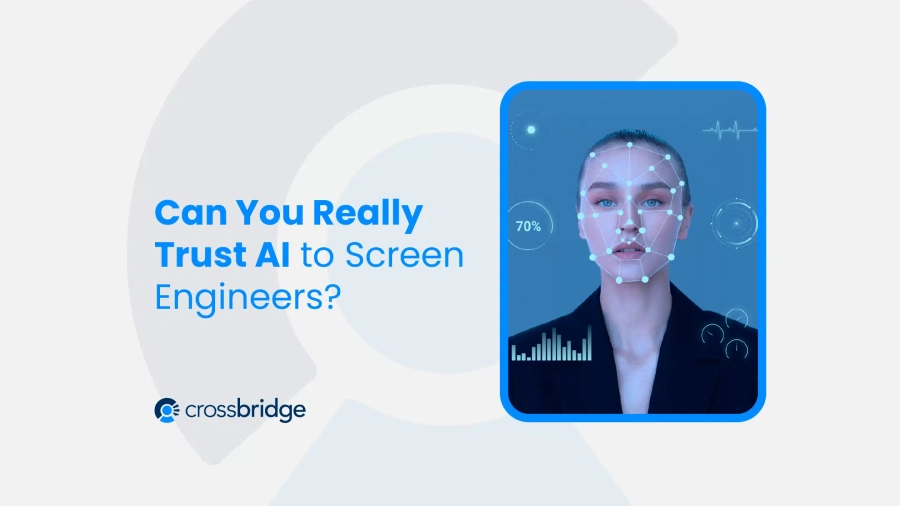It’s tempting. Fast, objective, scalable.
Drop in a stack of resumes, let the algorithm rank the top candidates, and voilà—you have your shortlist.
But here’s the real question: Can you really trust AI to screen engineers?
Because when we zoom in, we see a pattern:
- Promising candidates get filtered out.
- Buzzword-heavy resumes float to the top.
- And some of the best problem-solvers never even make it to a live conversation.
Let’s break down why this is happening, and what CTOs and hiring leads can do differently.
Where AI gets it wrong
1. It favors keywords over capability
Most AI screeners rely on natural language processing (NLP) to match job descriptions with resumes. But engineers don’t always describe their skills the same way.
A brilliant back-end dev might say “built APIs” instead of “RESTful microservices.” That could knock them out of consideration, even if they’re your ideal fit.
What to do:
Use AI tools as a filter, not a decider. Always validate matches with human screening before rejecting.
2. It can’t test context
A candidate may list Python on their resume, but how did they use it? For what? With whom?
AI doesn’t know. It reads presence, not depth.
Why it matters:
An engineer who’s built a production-grade ML pipeline is very different from someone who took a Python course last summer.
And in small, high-stakes teams (like yours), context isn’t just nice to have, it’s the whole job.
3. It doesn’t understand potential
AI thrives on what’s measurable: titles, dates, degrees.
But that’s not how real engineering growth works. Some of your best hires might come from bootcamps, self-taught paths, or role pivots.
The risk:
You miss hungry, high-ceiling candidates who just haven’t had the “right” titles yet.
As Crossbridge co-founder Brent Slezak says:
“AI can sort resumes—but it can’t spot someone who’s ready to punch above their weight. That takes human instinct.”
The smart move: Combine AI with human instinct
The best hiring strategies in 2025 don’t reject AI—they reframe it.
Here’s what that looks like in practice:
1. Use AI to reduce noise, not make decisions
AI is great at narrowing large pools. You can use it to:
- Identify duplicate resumes
- Flag missing must-haves (e.g., legal eligibility, time zone mismatch)
- Group similar experience levels
But here’s where most teams get it wrong: they trust the ranking blindly. That’s risky.
Instead, use AI to surface a subset of candidates, then hand it over to experienced humans who know how to ask:
“Where did they learn this skill?”
“What challenges have they solved?”
“Can they communicate well in a real-world environment?”
2. Make your recruiters systems-thinkers, not resume-sorters
When hiring for engineering roles, your recruiters need to think more like PMs:
- What are the key outcomes this role will impact?
- What kind of engineer complements the current team?
- Are we hiring for scale, speed, innovation or all three?
This level of strategic thinking doesn’t come from a resume scanner. It comes from human context-building.
3. Use AI to augment the interview process, not replace it
AI interview tools can record answers, analyze sentiment, or assess pace, but they can’t detect nuance in tone, confidence, or adaptability under pressure.
What works better:
- Use AI to transcribe and summarize interviews (for speed)
- Pair with human evaluators who can spot signals, like curiosity, emotional intelligence, and clarity of thought
The bottom line
You don’t need to go fully manual.
You don’t need to go fully AI.
The smartest teams are doing both, automating the right things and humanizing the rest.
AI can’t replace your recruiter’s gut feeling after 3,000 interviews.
And it definitely can’t replace a thoughtful conversation between two engineers who’ve solved real problems.
So if you’re ready to stop trusting AI blindly and start building a process that works with your team instead of around it… Let’s talk about how we do it differently
Key Takeaways
Can you trust AI to screen engineers?
Not completely. AI can support early screening, but without human oversight, it often misses qualified candidates or overvalues irrelevant data.
What are the limitations of AI in engineering hiring?
AI struggles to evaluate context, potential, and soft skills. It prioritizes keywords, not nuance.
Should I use AI in my hiring process?
Yes—with caution. Combine it with human judgment, structured interviews, and role-relevant assessments.
